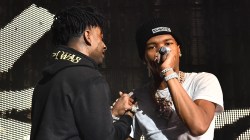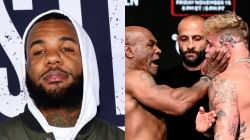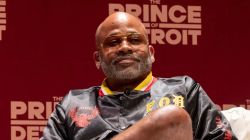Kanye West went magnanimous for My Beautiful Dark Twisted Fantasy’s promotional push. He created the “G.O.O.D. Friday” campaign and delivered free songs to the fawning masses each week leading up to its November 2010 release. There were fantastic tales of a glorious gathering of Hip Hop luminaries crafting the potential classic in an exclusive Hawaiian hideaway floating all over the internet and a 35-minute short film to accompany the second single, “Runaway.” The George Condo cover art was banned from certain retail stores, something West reportedly intended. It was a crafty, stadium-sized media blitz to accompany the album’s stadium-sized sound. For Yeezus, Yeezy ended up minimalistic. Outside of another memorable Saturday Night Live performance then beaming the confrontational “New Slaves” video on the side of buildings around the world in the same weekend and that grainy clip of Ye’, Executive Producer Rick Rubin and Mike Dean recording “I Am A God” posted to KanyeWest.com last week, the buildup was minor in comparison, albeit haphazardly. There’s still no huge radio single. The album apparently doesn’t even include artwork—just a clear jewel case with a piece of red tape on the right side. Intentional or otherwise, it’s a stripped down campaign mirroring the album’s stripped down sound. Yeezus is audacious, ornery and miles outside of what’s expected from Kanye West, and often what’s conventionally accepted in Hip Hop.
Opener “On Sight” is not only the exact opposite of an album highlight but may also be the crudest track Ye’s yet to release. “Black Timbs all on your couch again / Black dick all in your spouse again / And I know she like chocolate men / She got more niggas off than Cochran,” he kicks over little more than a skeletal cascade of electronic blips and zips. “For my theme song / My leather black jeans on / My ‘By any means’ on / Pardon I’m getting my scream on,” he charges on “Black Skinhead,” a rumbling force that sounds more fitting on a Marilyn Manson release than something synonymous with the makeup of Kanye’s collection. Both teem with passion and aggression, plastering Yeezus with a pseudo 808s & Heartbreak aesthetic—call it 808s & Anger.
It’s likely too soon for the populace to cosign Kanye’s “The only rapper compared to Michael [Jackson]” bar on “I Am A God,” but it was initally too soon when Jay-Z brazenly alluded to being better than the Notorious B.I.G. on The Blueprint’s “Hola Hovito” in 2001 (“And if I ain’t better than Big / I’m the closest one”). In the end, the masses sided with Hov. Some statements are too uncomfortably cocky to digest without time and consideration. But West’s “I feel my confidence + someone’s low self-esteem = my arrogance” quote from his motivational booklet, Thank You And You’re Welcome given away for free during his 2008 Glow In The Dark tour comes to mind when gawking at the super-sized, superego he sports like his Yeezy Red October signature sneaker. Everything about this song bluntly broadcasts a bold, possibly off-putting level of self-importance but from a position common in works like Miguel Ruiz’s The Four Agreements, Paulo Coelho’s The Alchemist as well 5 Percenter ideology and Scientology. (Yeezy’s neither. Yeezy “just talked to Jesus / He said ‘What up, Yeezus’”). So lines like “I know He the Most High / But I am a close high” would ring pretentious if the track wasn’t so lowkey empowering, falling in line with a strain of enlightenment creeping back into the ethos. Snoop Dogg went Snoop Lion in 2012. People build billion-dollar businesses in their bedrooms. Hov just persuaded Samsung to buy a million copies of an album before it dropped, give it away for free, then announced it during the NBA Finals—essentially going platinum before being available. Mankind is making godly leaps at the speed of a right click, even though comments sections World Wide Web-wide seem to indicate otherwise. “I Am A God” is awesomely on-point—gratuitous screaming and all.
Solid swaths of social commentary align nearly every Kanye West release. Here the Civil Rights references return only now much more inflammatory, pushing the margins to the brink of a breach. Which may explain the album’s brevity. At 40 minutes and six seconds, Yeezus is by far his shortest LP (Graduation follows at 51:12 minutes). Gone are the scenic bridges and angelic choirs littered lushly throughout his previous work. This one’s an exercise in minimalism—right down to the minute. That’s fortunate. Anger overkill rarely equals replay value. Precisely when the rage is about to spill into repellent, quintessential Kanye returns. The album’s second half is sonically similar to most anything found on Graduation through My Beautiful Dark Twisted Fantasy.

AD LOADING...
It’s interesting to hear Yeezy deride wealthy private prison owners and their Hampton spouses on “New Slaves” then describe how the club is so packed that he “might ride around on [his] bodyguard back like Prince in the club” five tracks later on “Send It Up” (featuring King Louie). He follows that awesome Dave “Chappelle Show” allusion with “She said ‘Can you get my friends in the club?’ / I said ‘Can you get my Benz in the club?’ / If not / Treat your friends like my Benz / Park they ass outside til the evening end / When I go raw I like to leave it in…Yeezus just rose again.” At the Yeezus release party in Los Angeles, California last week, bold orange tape was wrapped around each of the name brand logos on the liquor bottles as if to say that no corporation gets free promotion from Kanye West. Then he kicks enough name brands to question his commitment to a message of counter-consumerism. But Yeezy’s the best since Tupac at etching his disparities in ALL CAPS, unabashedly reveling in confliction.
What makes West’s sixth solo album compelling despite its gaggle of haunting shrieks and leftist production is that Kanye manages to remain as entertaining as ever. From mic to plug, the album is supremely Tweetable—loaded with enough incredible quips to start a T-shirt line. “When a real nigga hold you down / You’re supposed to drown,” may be the most real relationship lyric yet heard in 2013 (“Bound 2”). And for such a disconnected first spin, Yeezus becomes increasingly addictive with each additional listen, an indicator of high replay value potential. This captivating level of contextual and sonic tension places the project in art-piece territory, representing a jagged installation added to West’s almost all classic solo catalog. A slurred hook from Chief Keef perfectly accentuates “Hold My Liquor’s” (featuring Justin Vernon) sublime depiction of a drunken excursion to an ex-girlfriend’s home in search of reconciliation, for example. “I’m In It”—with its made for club fornication commentary, Reggae inspiration and hilarious “I be speaking Swag-Hili” musings quickly embed itself Indian-style into the eardrum. And if there’s one song that must be heard immediately, it’s “Blood On The Leaves.” Interpolating elements of Nina Simone’s segregation era ballad, “Strange Fruit” with the bombastic horns from C-Murder’s “Down For My Niggas,” Ye’s emotional exhale on a relationship gone wrong and side chicks trying to purposely get pregnant works in every setting: The gym, the car, the club, the crib. Bravo.
Where does an artist move creatively after nine years of trailblazing trendsetting? Kanye West has been at the forefront of Hip Hop and Pop Culture since his 2004 entrance with A College Dropout. His sound, his style and his wardrobe have continuously been repurposed by scores of ball-ticklers throughout his career. Compound that with a high profile relationship with a reality show princess and a perceived knack for dancing in his self-described douchebaggery, and this album has all the trappings of a polarizing offering. Music is especially turnt up these days, so as he bumrushes impeccably on the aforementioned “New Slaves,” Kanye’s decided to “tear shit down,“ removing the glossy trimmings, flexing a sense of addition by subtraction. It’s easy to love this album and it’s easy to hate it. Landing anywhere in between is difficult. Attempts to label this traditional Hip Hop or otherwise are futile—but society is tagged with enough labels already. Yeezus, like Yeezy, is jarring, uncomfortable, uncompromising and courageous—all the things that initially made Hip Hop great.

AD LOADING...
RELATED:Yeezus Saves: Kanye West, Black Power & Consumerism [Editorial]



